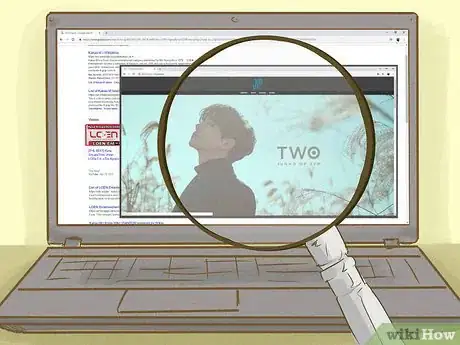This article was co-authored by Yolanda Thomas. Yolanda Thomas is a Hip Hop Dance Instructor based in Los Angeles, California and Sydney, Australia. Yolanda has taught hip hop at the Sydney Dance Company and is a two-time winner of the LA Music Award for singing and songwriting. She has won Choreographer of the Year by GROOVE, an Australian hip hop dance competition and was hired by Google to choreograph their Sydney Mardi Gras float.
There are 17 references cited in this article, which can be found at the bottom of the page.
This article has been viewed 771,513 times.
Before K-pop singers were stars, they were trainees. Trainees live, train, and perform together starting at a very young age. Some trainees start as young as 11 years old, but many don’t get discovered and join a company until they’re in their late teens, so don’t despair if you’re a little older! Many K-pop trainees and idols are Korean, but it’s not an absolute requirement to be Korean - people of all ethnicities and races can audition. Skill and persona have a lot to do with your potential success, as does your willingness to do hard work.
Steps
Cultivating Your Skills
-
1Take dance classes to become a better and more versatile dancer. Especially if you don’t have much practice dancing yet, look into taking as many different classes as you can. Focus on hip hop and urban dancing. A big part of being a trainee (and hopefully an idol!) is being able to perform exceptionally, and that includes dancing.[1]
- If you can’t take actual classes, use the internet to learn new skills.
-
2Invest in a vocal coach to strengthen your singing abilities. Even if you’re already a great singer, chances are you could still learn something from a coach. If nothing else, they can give you tips to increase your endurance when you perform.[2]
- If your main skill is dancing, that is okay! But having the ability to sing will increase your odds of getting noticed when you audition to become a trainee.
Advertisement -
3Work on your rapping skills to round out your skill set. Rapping is an important part of the K-pop lifestyle, and it can also be fun! Listen to more rap music to get an idea of the rhythm and start imitating your favorite artists.[3]
- If you get caught up on the words, practice tongue twisters to loosen your lips.
-
4Practice writing your own music and perfecting well-known songs. When you audition, you’ll need to perform songs that the producers already know, but when you’re a trainee, you’ll be working on writing and choreographing your own original music. It’s a good idea to work on both aspects of being a performer.[4]
- Take a music writing class if you can, and spend a lot of time listening to K-pop and watching music videos so you can start emulating popular styles.
Adopting New Habits
-
1Familiarize yourself with Korean cultural norms and beauty standards. Though many companies will accept non-Korean trainees, you will still be catering to a largely Korean audience. It’s smart to learn about the culture if you aren’t already familiar. Study popular K-pop groups, spend time on Korean fashion websites, and read up on etiquette and social norms.[5]
- If you aren’t Korean, it’ll show the producers that you are invested in becoming a K-pop trainee and are willing to work hard to be a part of the culture.
-
2Learn to speak Korean if it isn’t a language you’re familiar with. At a minimum, make sure you know basic phrases like “hello,” “goodbye,” “please,” and “thank you.” Though, the more you know, the better! You will have to sing in Korean at least some of the time if you become a trainee, and knowing the language will also help you make friends and get around in South Korea.[6]
- If you can’t take a Korean language class, try downloading an app like EggBun or Duolingo.
-
3Avoid scandal and be careful with what you put on social media. A big part of being a successful trainee is characterized by having good manners and behaving properly. Try to stay out of situations where you might get in trouble, like, for example, being at a party where there is underage drinking. And use caution when putting things on social media. Managers and executives can most likely see your accounts.[7]
- Producers are interested in trainees who have the right skill and are willing to work hard. They aren’t interested in trainees who end up in the spotlight because they’re often in trouble or causing drama.
-
4Create a YouTube channel to upload videos and create a following. Start recording your original songs, as well as your covers. Feel free to experiment with videos that show you talking about your experience in your pursuit to becoming a K-pop trainee. Producers often visit YouTube channels when looking for new recruits.[8]
- Create a schedule for posting so that you’re regularly adding new content to your channel, and research different ways to grow your audience.
-
5Maintain a healthy weight and be in good shape. Some companies are looking for recruits who are very slim, while others will happily accept trainees who are a little bigger. But regardless of your size, you need to be able to keep up with the rigorous physical requirements, like hours of dance classes everyday.[9]
- If you are out of shape or want to lose weight, incorporate daily exercise into your routine and try to eat more whole foods rather than processed foods.
Auditioning to Become a Trainee
-
1Research which company you’d like to audition for. Some of the major K-pop companies are SM, JYP, YG, Cube, LOEN, Pledis, Woolim, and BigHit. Some companies are focused on trainees who match a certain aesthetic and already know how to sing and dance, while others don’t mind taking someone who looks a little different from the norm or who needs more training in a particular area.[10]
- You could audition for every opportunity you come across, but that might get expensive and time-consuming. It’s a good idea to find the company that seems most likely to accept you and focus your attention on their auditions.
- It’s also good to note that if you’re under 14, a legal guardian will need to attend or sign-off on the audition for you.
-
2Become an expert in your skill and be confident when you audition. Most K-pop trainees are great at one of the following skills: singing, dancing, or rapping. Make sure to have one really strong skill and a familiarity with everything else. For example, if you are strongest at dancing, take classes and hone that skill as best as you can, but also don’t neglect to work on your singing and rapping, too.[11]
- No matter where you end up, you’ll be taking hours and hours of classes for all of the skills needed to be a K-pop idol. But having a strength when you set out to addition could help you stand out to the producers.
Advertisement -
3Prepare 3 songs for an audition, 1 of which should be Korean. Think about where your talents shine, and then make your song selections based off of that talent. For example, if you’re great at rapping and dancing, choose 1 song that is in Korean that showcases your rapping and dancing skills, choose another that exhibits another type of dancing, and then choose a song that you absolutely love—the producers will get a chance to see your skill and your passion![12]
- Search YouTube for audition videos to check out what other hopeful trainees are doing.
-
4Get headshots done to hand out or send to producers. You can have these done professionally, or you can try to do them yourself at home. Take shots from the front and profile, and include photos of just your face as well as your entire body.[13]
- Wear minimal makeup for your headshots, as producers will want to see your face on its own.
-
5Wear normal clothes and minimal makeup on your audition day. The judges will want to see what your face and body look like without excessive makeup or body-altering clothes (like Spanx). K-pop trainees live in a world controlled by the company, and they will be choosing your clothes and styling your makeup and hair for you when you perform or make public appearances.[14]
- Avoid wearing K-pop fan clothing—producers might assume you’re at the audition to get to see your idol.
-
6Attend a live audition or submit an online audition if you’re overseas. There are tons of live auditions that take place all over the world, so chances are you can find one in your country to attend. If you can’t attend a live audition (or even if you can but want to submit more work), check out each company’s online audition forum at their websites.[15]
- Online auditions are a great option for people hoping to be trainees! Live auditions are great for the experience and opportunity, too, but don’t discount the possibility of getting discovered through an online audition.
-
7Be resilient—it can take a long time to get accepted as a trainee! A lot of people audition time after time after time before they finally get chosen to be a trainee. If you get feedback from an audition, make sure to incorporate it before your next one. For example, if a judge says that you need to work on your vocal strength, start seeing a vocal coach to work on that.[16]
- Don’t worry if you’re older and still not a trainee. Lots of K-pop idols didn’t get started in a company until they were in their late teens. Keep working on your skills and attending auditions.
Living the Trainee Lifestyle
-
1Realize that it might be hard to make friends if you’re a foreigner. Trainees often sign years-long contracts and spend upwards of 18 hours a day with the other trainees. If you don’t speak Korean or are unfamiliar with the culture, it may take a while before you make friends and feel like you fit in.[17]
- Make an effort to try and communicate clearly with others, especially if there is a language barrier. And also try to be kind to others—that can go a long way when you’re away from home and trying to be successful while also making friends.
-
2Read your contract carefully before committing to a company. Being a K-pop trainee is a longterm commitment! Some companies, depending on your age, may even ask you to sign a 5-6 year contract. Be sure to read and review the contract language very closely. If you don’t speak Korean, hire a professional lawyer who does to review the fine print.[18]
- Lots of companies make you repay your salary if you break your contract. Some of them also don’t make accommodations for emergencies or health issues. Don’t sign anything before you fully understand it.
-
3Take good care of your health to withstand the grueling schedule. Many trainees work from 5 or 6 am until midnight or 1 am. In addition to training, you may also have schoolwork that has to be done or need extra practice on your own.[19]
- The company often sets the schedule for their trainees without running it by them first.
- Trainees generally don’t get the recommended amount of sleep every night, and they often don’t eat meals at regular intervals.
-
4Be prepared for monthly evaluation tests. Because new trainees are often being brought into the company, everyone is evaluated on a monthly basis to ensure that the recruits are all up to standard. It can be a tense time every month as the company could choose to let you go if you don’t perform well.[20]
- There are generally 20-30 other students at any company at any given time, so you are usually going to be in competition with your classmates to keep your place at the company.
Community Q&A
-
QuestionWould they pay for the fees for the flight? What we're a trainee's schedule is?
 Community AnswerThey will pay for the fee if you are overseas, most of the times if you are overseas and they ask you to pay, consider it a scam and don't pay the money. And normally it really depends on you, yourself. Trainees have different schedules like school. Some trainees may have dance, then singing, then rapping, then acting, then language it just really depends on you. And normally trainees wake up around 5 am.
Community AnswerThey will pay for the fee if you are overseas, most of the times if you are overseas and they ask you to pay, consider it a scam and don't pay the money. And normally it really depends on you, yourself. Trainees have different schedules like school. Some trainees may have dance, then singing, then rapping, then acting, then language it just really depends on you. And normally trainees wake up around 5 am. -
QuestionWhen auditioning, does the song/rap have to be in Korean or can it be in a different language, such as English?
 Community AnswerYou may audition in English or Korean.
Community AnswerYou may audition in English or Korean. -
QuestionI'm embarrassed to dance and sing in front of people. Can you suggest how I can beat that fear?
 Community AnswerTry using earphones while dancing or singing (or at least just an earbud). Close you eyes for a little bit. Then wing it, and for as long as you do it, you'll eventually get used to the feeling of being in front of others while dancing or singing.
Community AnswerTry using earphones while dancing or singing (or at least just an earbud). Close you eyes for a little bit. Then wing it, and for as long as you do it, you'll eventually get used to the feeling of being in front of others while dancing or singing.
Warnings
- If you aren’t from South Korea and become a trainee, you may have to move there to participate in the industry, so think carefully about whether or not that is something you want for your life or something that your family can accommodate.⧼thumbs_response⧽
References
- ↑ https://youtu.be/klKcQt_awWw
- ↑ https://ehomerecordingstudio.com/how-to-learn-to-sing/
- ↑ https://www.flocabulary.com/freestylerap/
- ↑ https://youtu.be/XNns0rGuzr0?t=252
- ↑ https://youtu.be/XNns0rGuzr0?t=110
- ↑ https://youtu.be/1Wew7m6phCQ?t=284
- ↑ http://www.rojakdaily.com/entertainment/article/1728/the-extremes-that-koreans-take-to-become-a-kpop-idol
- ↑ https://youtu.be/XNns0rGuzr0?t=39
- ↑ http://www.rojakdaily.com/entertainment/article/1728/the-extremes-that-koreans-take-to-become-a-kpop-idol
- ↑ https://kprofiles.com/popular-kpop-entertainment-company/
- ↑ https://youtu.be/XNns0rGuzr0?t=280
- ↑ https://youtu.be/1Wew7m6phCQ?t=219
- ↑ https://www.backstage.com/magazine/article/tips-better-headshot-11730/
- ↑ https://youtu.be/1Wew7m6phCQ?t=30
- ↑ https://www.koreaboo.com/lists/9-steps-every-trainee-must-go-debut/
- ↑ https://www.koreaboo.com/lists/9-steps-every-trainee-must-go-debut/
- ↑ https://youtu.be/XNns0rGuzr0?t=397
- ↑ https://www.koreaboo.com/lists/9-steps-every-trainee-must-go-debut/
- ↑ https://youtu.be/XNns0rGuzr0?t=131
- ↑ https://youtu.be/XNns0rGuzr0?t=179
About This Article
If you want to be a K-pop trainee, start perfecting your performance skills by taking dance classes, investing in a vocal coach, and practicing your rapping. Then, brainstorm ideas to write your own songs and begin performing them by singing, dancing, and rapping. If you want to move to Korea to further your career, familiarize yourself with the beauty and cultural standards for pop stars there, and start practicing your Korean. Set up auditions with companies like SM, Cube, and BigHit, and be confident during your performance. For tips on nailing your audition and getting used to the lifestyle of a K-pop star, read on!










































































